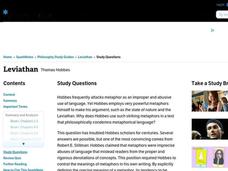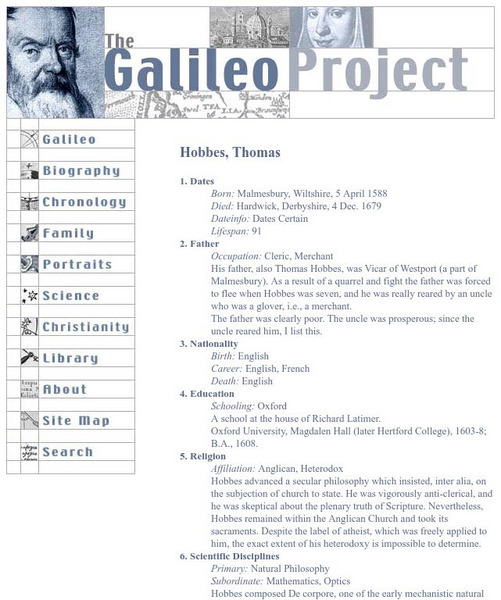iCivics
Why Government?
Why do people create governments? Where did we get our ideas about government? This is a fantastic introductory lesson for your American government class that begins by reviewing the philosophies of Thomas Hobbes and John Locke in...
Curated OER
The Enlightenment in Europe: Ch 22
Why study European Enlightenment? Because our governing forefathers and constitution were shaped by their words and philosophies. Presented here are facts and achievements of 8 different figures from the enlightened era. Also included is...
Curated OER
The Enlightenment: Matching #5
The enlightenment was a time of growth for parts of the world, and its spirit inspired future generations. Learners match ten descriptions to the proper person or item definitive of the enlightenment.
Curated OER
Leviathan
For this online interactive history worksheet, students respond to 10 short answer and essay questions about Leviathan by Hobbes. Students may check some of their answers on the interactive worksheet.
Curated OER
Leviathan
In this online interactive philosophy learning exercise, students respond to 17 multiple choice questions about Hobbes's Leviathan. Students submit their answers to be scored.
Curated OER
Four Enlightenment Thinkers
Students examine lives, philosophies, and political beliefs of four Enlightenment Thinkers: Baron de Montesquieu, Jean-Jacques Rousseau, Thomas Hobbes, and John Locke. Students then work with partner to write short speech from...
Curated OER
Unit 12: Enlightenment and French Revolution
In this Enlightenment lesson, learners respond to 34 short answer questions about John Locke, Thomas Hobbes, Baron de Montesquieu, Jean Jacques Rousseau, Voltaire, Denis Diderot, and Mary Wollstonecraft.
Curated OER
The Age of Absolutism
In this online interactive world history worksheet, students answer 9 multiple choice questions regarding French history. Students may submit their answers to be scored.
Luminarium
Luminarium: Life of Thomas Hobbes (1588 1679)
This site provides a lengthy overview of the life and work of Thomas Hobbes (1588-1679 CE). Content includes a focus on Hobbes' "Leviathan" and the personal controversy that followed.
Other
Modern Political Theory
This site contains a question and answer format on the theories of Locke and Hobbes. It answers questions about the political system and social contract, as well as theorizing about the state of nature and rights of man.
Oregon State University
Thomas Hobbes
This site provides a short biography, and some links to relevant sites.
Other
Pre History of Cognitive Science: Thomas Hobbes
This article analyzes the philosophy contained in such works as "Leviathan." A good starting point for research on Hobbesian philosophy.
Internet Encyclopedia of Philosophy
Internet Encyclopedia of Philosophy: Thomas Hobbes
This site from The Internet Encyclopedia of Philosophy provides a comprehensive survey of the life and philosophy of Thomas Hobbes. It discusses his writings as well as his ideas on moral and political philosophy.
Indiana University
Iu: Thomas Hobbes (April 5, 1588 December 4, 1679): English Philosopher
Begins as a bullet-style biography, then a great section called Ideas and Contributions.
Boston University
Boston University: The Social Contract Tradition
This site presents an abstract of the social contract tradition. It also contains a very detailed overview of the ideas of Hobbes, Locke, and Rousseau.
Digital History
Digital History: By What Right [Pdf]
Two opposing philosophies concerning the relationship between government and its citizens were expressed by Thomas Hobbes and John Locke in the 17th century. Compare these two philosophies and see how they were related to the colonists'...
Rice University
Galileo Project: Thomas Hobbes
This site from The Galileo Project of Rice University presents Hobbes' life in an outline, giving easy access to the critical information. This is a great site to check out for information on the subject.
Oregon State University
Leviathan by Thomas Hobbes'
This site provides an e-text of the Leviathan, written by Thomas Hobbes.
Oregon State University
A Brief Life of Thomas Hobbes, 1588 1679
This article surveys the life and work of the English philosopher John Hobbes (1588-1679).
Oregon State University
The Elements of Law Natural and Politic
This site provides the entire text document of "The Elements of Law Natural and Politic" by Thomas Hobbes. This is a detailed document and very informative.
McMaster University
Mc Master University: A Survey of Mr. Hobbes His Leviathan
This site contains a paper, "A Survey of Mr. Hobbes His Leviathan" by Edward, Earl of Clarendon, written on Hobbes's "Leviathan" and game theory. After a lengthy and unreadable introduction, the author surveys Hobbes's work by chapter.
CommonLit
Common Lit: Excerpts From Leviathan
A learning module that begins with "Excerpts from Leviathan" by Thomas Hobbes, accompanied by guided reading questions, assessment questions, and discussion questions. The text can be printed as a PDF or assigned online through free...
iCivics
I Civics: Thomas Hobbes Mini Lesson
Thomas Hobbes was one of the first of his era to discuss the idea of the social contract. Explore his views on government and his famous book, Leviathan.
iCivics
I Civics: Why Government?
Dig into philosophers Thomas Hobbes and John Locke's ideas and see how they've influenced those that have followed in their footsteps.















